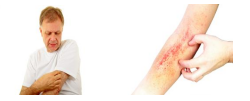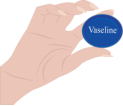[Micro Popular Science] Skin Itching in the Elderly
As we age, many people find that their skin becomes drier and more sensitive, and the problem of itchy skin arises. This phenomenon is particularly common among older people and can affect their quality of life. This article will discuss the causes, preventive measures and countermeasures of skin itching in the aged.

First, the causes of itchy skin in the elderly

1. Dry skin
As we age, the skin's natural oil production decreases, leading to water loss, which makes the skin dry, rough and prone to itching.
2. Changes in skin structure
The thickness and elasticity of the skin of the elderly are reduced, the epidermal layer is thinner, the protective function is weakened, and it is vulnerable to external stimulation.
3. Chronic diseases
Chronic conditions such as diabetes, kidney disease, and abnormal thyroid function can cause dry and itchy skin.
4. Drug side effects
Some commonly used medications (such as diuretics, blood pressure medications, etc.) may cause dry and itchy skin.
5. Environmental factors
Dry weather, frequent bathing, and the use of harsh cleaning products can worsen dryness and itching.
6. Allergic reactions
Older people may have allergic reactions to certain foods, medications, or substances in the environment that cause itchy skin.
Ii. Preventive measures

1. Keep your skin moisturized
Use a moisturizer regularly, especially after showering and before bed, to help lock in moisture. Petroleum jelly can be used.
2. Choose gentle cleaning products
Use fragrance-free, non-irritating bath products and avoid using hot water.
3. Maintain indoor humidity
In the dry season, you can use a humidifier to increase indoor humidity and reduce dry skin.
4. Watch your diet
Increasing intake of foods rich in omega-3 fatty acids (such as fish, nuts, etc.) can help improve skin condition.
5. Get regular checkups
Check your body regularly to detect and treat chronic conditions that may be causing skin problems.
Third, coping methods
Step 1 Apply a cold compress
For local itching, you can use cold water or an ice pack to relieve the discomfort.
2. Avoid scratching
Scratching can cause skin damage and infection and should be avoided.
3. Appropriate medication
Use anti-allergy medications or topical creams under the guidance of your doctor to relieve itching symptoms.
4. Seek professional help
If the itch persists or is accompanied by other symptoms (such as redness, swelling, rash, etc.), you should seek medical attention and seek professional dermatologist for treatment.
Conclusion
Although the elderly skin itching is common, but through reasonable prevention and response measures, can effectively improve the skin condition, improve the quality of life. Maintaining good living habits and paying attention to skin health is something that every elderly person should pay attention to. I hope this article has provided you with some useful information to help you better deal with the problem of itchy skin.
Authors: Xie Jun and Xie Wanyu, Zhongnan Hospital, Wuhan University
(The opinions expressed are solely those of the author. Some pictures in this article are from the Internet, if there is infringement, contact delete)

